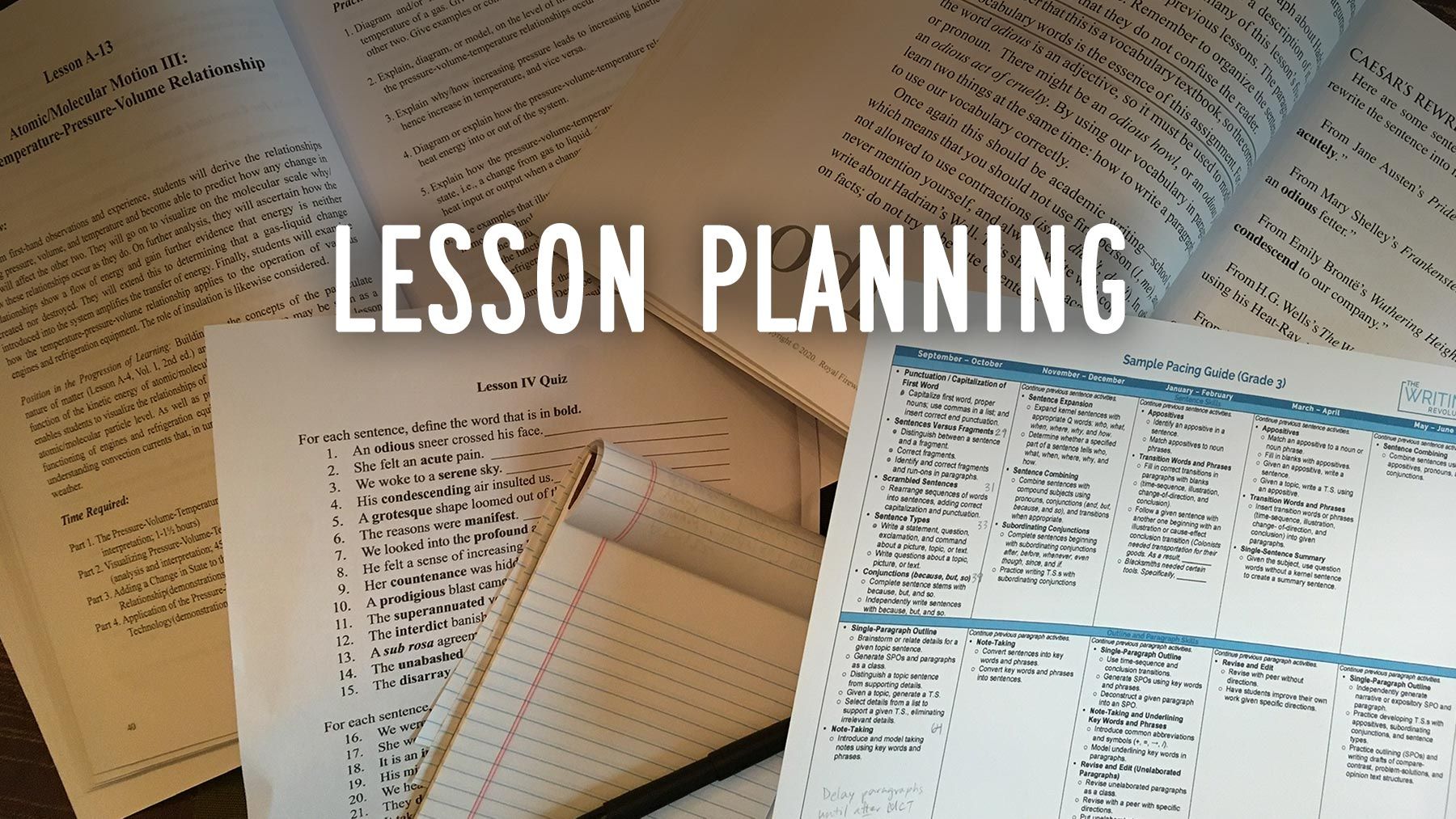Lesson planning

Here's a peek into what my lesson planning looks like. Typing it up for this post makes it seem a bit more organized than it is. This is an accurate picture of what I do, but I haven't thought of it as a formalized system or anything. These are just the habits that have emerged, turned into a snappy outline.
First up, how much planning each of our curriculum pieces seems to require, on a made-up-just-now scale of 1-5, 1 taking no planning, 5 taking heavy planning:
Beast Academy (math)
Planning rating: 1
This has been truly open-and-go, haven't ever needed to do anything to prep.
Michael Clay Thompson (language arts)
Planning rating: 2
Minor prep, I read ahead a little bit so I can chew a bit on the concepts to prepare for our conversations. Sometimes I have a page or two to photocopy.
Spelling analysis
Planning rating: 2
I keep a running list of spelling words in my phone, takes almost no time at all. I printed out a bunch of copies of our special spelling paper in one big batch, so it's always handy.
Mindset Mathematics (math)
Planning rating: 3
I often have some printing to do, and even creating manipulatives. Also takes some pondering of the concepts, thinking about how I can nudge her thinking.
Logic of English (language arts)
Planning rating: 3
We've finished this curriculum. For most people, it would be very close to open-and-go—it's even scripted—but there is a bit of gathering materials. It took me a bit more prep because she only needed to be doing maybe half of the lessons, so I read ahead to create a list of which lessons we would do, and which we would skip.
The Writing Revolution (language arts, history, science, geography...)
Planning rating: 4
Each activity needs to be created based on other reading/learning we're doing across different subjects, usually in science or history, and it takes some thoughtful design. I created some Google Docs templates that make this much easier, and it's getting easier with practice.
Building Foundations of Scientific Understanding (science)
Planning rating: 5
Our science curriculum takes the most advance planning. It's choose-your-own-adventure style: you choose which lesson to do next, but there are prerequisites, there is a bit of order to them. There are often materials that need to be purchased ahead of time for the experiments. There's no reading for the kid, and no script for the teacher, but rather a general guide for how you want the conversation to go, so I have to pre-script a bit in my head. I need to make sure I'm understanding the concepts, and how they're being explained, thoroughly.
(Not included are a bunch of bits & bobs that may not require significant planning; learning is always happening in myriad ways beyond our big curriculum pieces.)
And here's what that planning looks like:
Weeks ahead:
- Skim the curricula content to build a mental picture of what we'll be covering over the next month or so
- Keep an eye out for any materials that need to be ordered
- Start thinking about other resources or activities that could reinforce or extend the concepts being taught: YouTube videos, hands-on activities, books, etc.
- Research possible far-future curricula for possible purchase
- Research and order books for reading, either from the bookstore or the library
- Research educational shows to watch during lunch
A few days ahead:
- Read the lessons, anticipating where conversation could go, think about ways to make clear explanations, such as analogies
- Check we have all the needed materials and equipment
- Photocopy or print needed materials
- Read up to learn, and/or hit YouTube to learn
- Watch supporting YouTube videos for Wanda, and select the best ones
- For The Writing Revolution, create lessons
- Update our schedule planner, Tick Tick
The night before, or in the morning:
- Read the lesson one more time, to get it fresh in mind
- Look for potential logical stopping points in the lesson, to get a sense for how long it will take
- Get materials organized and handy
- Update our schedule in Tick Tick
This doesn't include one big help in my planning process: I actively read several Facebook homeschooling groups, which are an absolute treasure trove of great resources. For instance, on Tuesday morning, while Wanda was brushing her teeth, she had a lot of thoughts about climate change and what we could do. I already knew about a resource, a ~80 page course with activities about the science of climate change, so I was able to buy it inside of about five minutes, and get it printing during our morning lessons, and by mid-morning we'd launched into it.
Which brings up an important point: all this planning isn't set in stone, it can't be. It has to be flexible, because the best learning happens when Wanda is inspired, and ideally she's steering that ship more than I am. Good planning and good tools make flexibility possible: the plans I had are easily shifted forward a week or so, (thank you to Tick Tick's super-slick drag-and-drop!). Good planning makes shoving everything aside easy to do, and a moment of celebration, not defeat!
In a future post about our daily routine, I'll describe how these lessons fit together into a day.

